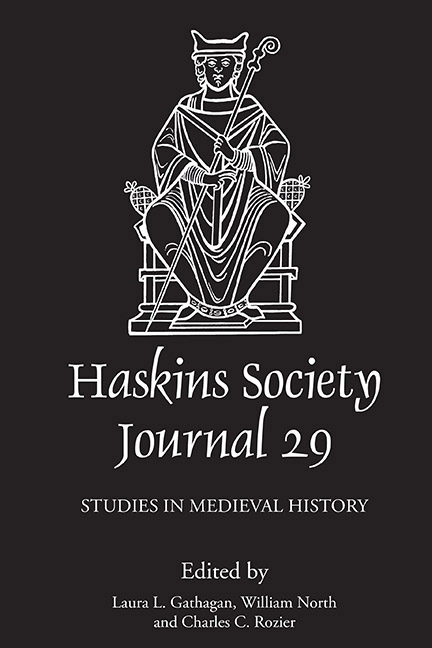Book contents
- Frontmatter
- Contents
- List of Figures and Tables
- Editors’ Note
- Abbreviations
- 1 The Longue Durée of a Symbolic System: Mounted Warriors and Horses in the Chronicon Salernitanum
- 2 Revolution(s) of Writing: Northern France, Tenth–Fourteenth Centuries
- 3 Slave or Free: The Aehtemann in Anglo-Saxon Rural Society
- 4 Norman Ducal Property in the Tenth and Eleventh Centuries: A Spatial and Chronological Analysis
- 5 The Codex Wintoniensis in its Twelfth-Century Context
- 6 The Carmen Ceccanense: A Neglected Source for the End of the Norman Kingdom of Sicily, Introduction – Edition – Translation
- 7 Succession and Interregnum in the English Polity: The Case of 1141
- 8 Crusading Participation in Normandy and its Borderlands: The Evidence from the Old French Traditions of the First Crusade
- 9 The Domesday Controversy: A Review and a New Interpretation
6 - The Carmen Ceccanense: A Neglected Source for the End of the Norman Kingdom of Sicily, Introduction – Edition – Translation
Published online by Cambridge University Press: 15 October 2019
- Frontmatter
- Contents
- List of Figures and Tables
- Editors’ Note
- Abbreviations
- 1 The Longue Durée of a Symbolic System: Mounted Warriors and Horses in the Chronicon Salernitanum
- 2 Revolution(s) of Writing: Northern France, Tenth–Fourteenth Centuries
- 3 Slave or Free: The Aehtemann in Anglo-Saxon Rural Society
- 4 Norman Ducal Property in the Tenth and Eleventh Centuries: A Spatial and Chronological Analysis
- 5 The Codex Wintoniensis in its Twelfth-Century Context
- 6 The Carmen Ceccanense: A Neglected Source for the End of the Norman Kingdom of Sicily, Introduction – Edition – Translation
- 7 Succession and Interregnum in the English Polity: The Case of 1141
- 8 Crusading Participation in Normandy and its Borderlands: The Evidence from the Old French Traditions of the First Crusade
- 9 The Domesday Controversy: A Review and a New Interpretation
Summary
At the beginning of the thirteenth century, the Norman kingdom of Sicily was thrown into chaos. The Holy Roman emperor Henry VI claimed the kingdom for his wife, Constance, after William II, the last Altavilla king of Sicily, died in 1189. Constance was the last legitimate heir of the Altavilla house, but a Sicilian party raised to the throne Tancred of Lecce, illegitimate grandson of Roger II, and one of the most important men in the political and military administration of the kingdom. After a first attempt to conquer the kingdom failed in 1191, Henry received the Sicilian crown only in 1194, after Tancred had died. Henry himself died three years later and was followed by his wife Constance in 1198. With her death, the last remnants of the imperial central government collapsed and subsequently many different forces tried to use this power vacuum for their own benefit. Apart from many internal struggles among the native nobility, the remaining German forces as well as papal armies fought one another with varying degrees of success, but with immense amounts of bloodshed and lawlessness. Henry and Constance's son, Frederick II, was still a child and became a political pawn in these struggles. Some German forces had stayed in the kingdom, led by Markward of Annweiler. While they were supported by the nobility, especially of Abruzzo and the Terra di Lavoro, their influence was much hated by other parts of the local population. This was reinforced by a large amount of anti-German propaganda and Pope Innocent III in 1198 calling for ‘the first political crusade’ against the Germans in the south. In 1201, a new force heeded his call and entered the kingdom. Walter of Brienne had married Elvira, a daughter of Tancred, and thus claimed her family heritage, the county of Lecce and the principality of Taranto. He was sent to conquer the kingdom for the papacy, but many believed he would also claim the crown for himself. Upon Walter's arrival in the south, some of the locals greeted him enthusiastically and took up arms to expel the hated German forces. Youths from much of Italy came to join Walter's army, among them a young Francis of Assisi, even though he changed his mind before he even arrived in the kingdom.
- Type
- Chapter
- Information
- The Haskins Society Journal 292017. Studies in Medieval History, pp. 139 - 180Publisher: Boydell & BrewerPrint publication year: 2018

